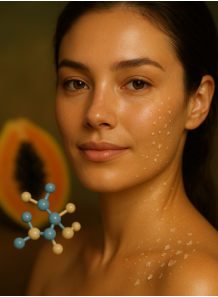Stabilized Papain (Liquid, Stable)
The product is a special type of Papain that passed through stabilization process allowing the papain solution be stable in all formulation that have pH range 4-6
Cart
No products
No products

The product is a special type of Papain that passed through stabilization process allowing the papain solution be stable in all formulation that have pH range 4-6
Papain (Carina papaya latex protease) as a Topical Active: Mechanisms & Evidence-based Skin Benefits
The product is a special type of Papain that passed through stabilization process allowing the papain solution be stable in all formulation that have pH range 4-6
Papain is a cysteine endopeptidase that cleaves the peptide bridges binding corneocytes, digests necrotic proteins in wounds and modulates pro-inflammatory pathways (e.g., NF-κB, MAPK). These actions translate into three main skin-care domains: enzymatic exfoliation/brightening, wound debridement & tissue repair, and anti-inflammatory/anti-scarring effects. Optimum activity lies around pH 5–7 and 30–60 °C; activity is quickly lost if the enzyme is not protected (or stabilized).
style="border: 1px solid #ddd; border-collapse: collapse; border-collapse:collapse;width:100%;"
Usage: For exfoliating products.
Mixing method: Mix in water (water-phase), avoid heat exceeding 40 degrees.
Usage rate: 1-5%
Product characteristics: Light-colored liquid
Solubility: Soluble in water.
Storage: Can be stored in a cool place (refrigerated recommended). Close the bottle tightly and keep away from sunlight, air or heat. The product has a shelf life of at least 2 years.
INCI Name: Water, Propylene Glycol, Dextrin, Papain, Glycerin, Phenoxyethanol, Chlorphenesin
| Mechanism | - |
| Appearance | - |
| Longevity | - |
| Strength | - |
| Storage | - |
| Shelf Life | - |
| Allergen(s) | - |
| Dosage (Range) | - |
| Recommended Dosage | - |
| Dosage (Per Day) | - |
| Recommended Dosage (Per Day) | - |
| Mix Method | - |
| Heat Resistance | - |
| Stable in pH range | - |
| Solubility | - |
| Product Types | - |
| INCI | - |